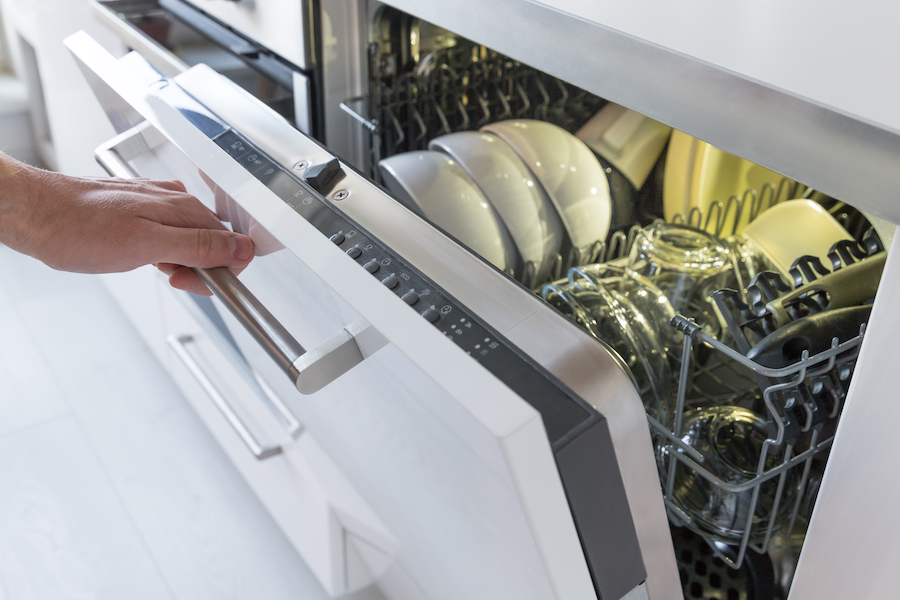My Dishwasher is Leaking…What May be the Cause?
We all love the convenience of just rinsing a dish and setting in the dishwasher to be cleaned. It's a luxury that has almost come to be taken for granted. But that luxury can be appreciated very quickly when one discovers a problem with their dishwasher. One common issue that can develop is when you notice your Dishwasher is Leaking.
In the post below, we will take a look at why possibly your Dishwasher is Leaking. Likewise, with each possibility we explore, we will discuss a possible solution to that given issue.
Why Your Dishwasher is Leaking
Many of us have faced the situation. You see the water underneath and in front of the dishwasher. Obviously, you'll want to put some towels down to dry up your floor, but then, our troubleshooting begins. Rest assured, when your Dishwasher is Leaking, many of the causes will leave you with an easy "do-it-yourself" fix. For exactly what to look for and how to go about fixing, see below.
Reasons that Your Dishwasher is Leaking
Before listing the possible reason that the Dishwasher is Leaking we should explain one situation to be aware of. This would be if you notice the leak happening while you run the kitchen sink. This would indicate a drainpipe issue. If that is the case, simply raise the dishwasher drainpipe above the level of the sink drain to rectify the problem
However, as with most instances, if the Dishwasher is Leaking while the dishwasher is running you could be facing any of the below problems.
Leaky Gasket
A faulty gasket on the dishwasher door is maybe the most common reason your Dishwasher is Leaking. To look and see if this is the issue, check the seal around the door. If there is a ripped or worn out area, replace the gasket and the leaking should be over.
Usage of Incorrect Detergent
If dish soap or laundry detergent is used in the dishwasher, this can cause excessive suds. Thus, the suds and water will seep out the door. To avoid this, only use the proper detergent for a dishwasher.
Cracked Hoses or Faulty Valves/Hose Connections
If your Dishwasher is Leaking and you notice the water coming from underneath, you have a water or valve issue. To address this, first either unplug the dishwasher or turn off the circuit breaker. To check and find the exact leak location, first, remove the toe kick from under the dishwasher. This allows access to each part you want to check. These include the water inlet valve, recirculation hose, drain hose, and other components. Simply run a hand along each of the hoses for a leak. Likewise, look for corrosions, loose connections, or a bad solenoid valve. Replacing any old or faulty parts can fix your issues and end the leakage.
Float Switch Problem
In the case that your dishwasher is too full, the doors are more likely to leak. The float switch functions to prevent the doors from overflowing. However, if the float switch is stuck on something, it may not work properly. If you see this, replacing that switch will solve the problem.
Drainage Issues
If your Dishwasher is Leaking and you noticed it has not been draining properly, the water level can rise too high. To check and fix drainage issues, look at the filter in the. bottom of the dishwasher. Remove anything that is clogging that filter and remove it.
Leaky Pump Seal
Give a check to the seal around your water pump to check this one. If you see water dripping from the pump housing or motor, you must remove the pump and then replace the rubber seal.
Dishwasher Sitting Crooked
This may seem an obvious check, however, it is important enough to remind you. The dishwasher must be set and sitting level to work correctly. To check this and be sure, use a carpenter's level and adjust accordingly. An even dishwasher will make it far less likely that your Dishwasher is Leaking.
If Your Dishwasher is Leaking and You've Tried all these Suggestions
If you've taken a look at the areas above and are still unsure or not comfortable addressing that your Dishwasher is Leaking, we have you covered. Simply contact us at poolesplumbing.com and we can advise or if you need to come out and take a look at the issue.






